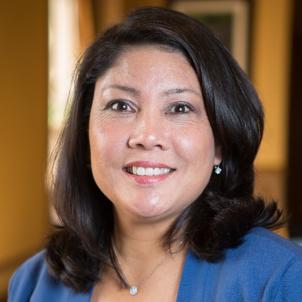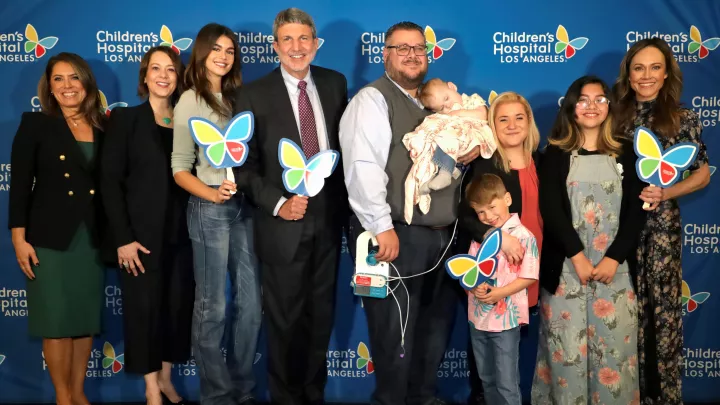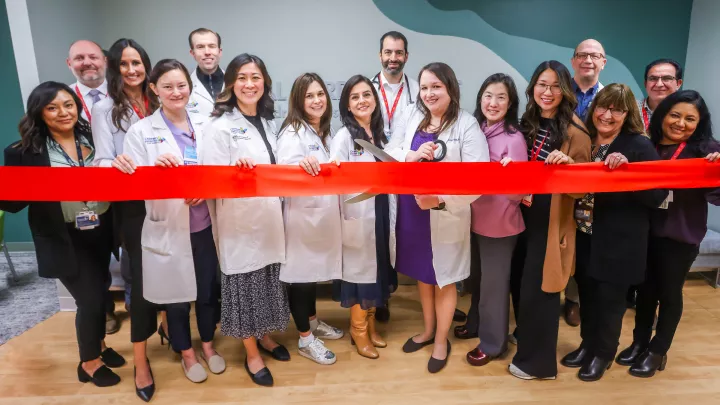Children’s Hospital Los Angeles Forms Nursing Leader Roundtable to Improve Best Practices at Regional Neonatal Intensive Care Units
LOS ANGELES (May 9, 2024) – Children’s Hospital Los Angeles (CHLA) has created the innovative Regional NICU Nursing Leadership Roundtable, comprised of CHLA and 20 community hospital neonatal intensive care units (NICU) in Los Angeles, Ventura and Kern counties. The initiative was developed by Kathy Van Allen, MSN, RN, CPN, the Administrative Director of CHLA’s Fetal and Neonatal Institute.

“There was a desire to bring nurse leaders together for peer collaboration, support, sharing of best practices, and to address issues specific to the nursing care of critically ill neonates,” explains Van Allen, a CHLA nurse leader overseeing CHLA’s NICU. “CHLA serves as the regional NICU for many local community hospitals, and it was key that we identify ways CHLA could better support the community NICUs and build relationships and engagement with referring hospitals.”
At hospitals throughout Greater Los Angeles, critical care teams treat the most seriously ill babies in NICUs. During the pandemic, Van Allen noticed a growing set of challenges affecting NICUs regionwide, and the need for a hub to address nursing best practices and support nursing leaders in a time of increased stress and mental fatigue.
“The roundtable provides a forum to discuss critical issues impacting NICU nursing practice and to create a supportive network for the NICU leaders,” says Van Allen. “Nursing leaders are susceptible to stress, psychological duress, mental fatigue, and exhaustion in their work environment and these negative aspects can influence their efficiency and effectiveness in leading their teams.”
CHLA’s Steven and Alexandra Cohen Newborn and Infant Critical Care Unit (NICCU), which admits more than 500 babies annually, serves as the hub for babies requiring complex neonatal intensive care. More than 90 hospitals throughout southern California and the western United States refer babies to CHLA’s NICCU. Additionally, the hospital’s Fetal and Neonatal Institute programs provide care to more than 2500 high risk infants and mothers and perform nearly 150 fetal surgeries each year.
The roundtable, comprised of regional NICU nurse managers, directors, and clinical nurse specialists, meets quarterly and exchanges information and resources that cover multiple domains of nursing leadership, including clinical practice, leadership, regulatory compliance, education, and innovation. Participation has grown by more than 50 percent since the first meeting in 2021, now drawing more than 20 participants representing the member hospitals at each forum.
“The peer-to-peer networking has engaged NICU nursing leaders throughout Southern California to collaborate on shared issues,” says Lara Khouri, MBA, MPH, Executive Vice President and Chief Operating Officer at Children’s Hospital Los Angeles. “The roundtable has created a collaborative space where leaders contribute and receive information and support, empowering them as managers. This has had a positive impact on the quality of care provided to the critically ill babies in these NICUs. As a regional NICU, CHLA is proud to lead this collaborative effort.”
Van Allen recently evaluated the initiative with a qualitative questionnaire for participants that revealed a number of benefits from the program, including:
- Gains in knowledge exchange and learning, collaboration and relationship building, leadership development and mentorship.
- Group validation of the improvements made with the efficiency of CHLA’s patient transfer workflow.
- Feedback on how CHLA could improve communication for updates on babies transferred from community hospitals and inform NICU teams about the availability of educational resources.
“The responses enabled CHLA to improve our service to the community,” Van Allen says. “We implemented weekly update calls to referring providers, made available key patient reports to the referring NICUs, and worked closely with our Information Services and Provider Relations teams to create a new access designation within our CHLA provider portal for referring providers to access patient records.”
CHLA also developed educational offerings for these hospitals, including webinars, availability of a NICU new graduate training course, certification review courses, and focused interdisciplinary education.
Van Allen says the collaboration and relationship building have contributed toward developing a cohesive network where leaders feel supported in their work. The relational networks extend both horizontally and vertically as these leaders interact with each other as well as with their teams. “There is ongoing communication between the nursing leaders in between the quarterly meetings to request and share information and provide each other with updates,” says Van Allen, who has presented her findings from the roundtable at regional and national nurse leader conferences.
In her presentations, she explains that the network demonstrates the attributes of workplace social capital – relational network, trust, shared understanding, reciprocity, and social cohesion – that help to create value for the leaders and empower them as they lead teams within their organizations. “Our members feel the network has been a safe space to communicate about issues, learn more about best practices for preemie care and implement public policies,” Van Allen says.
About Children’s Hospital Los Angeles
Founded in 1901, Children’s Hospital Los Angeles is at the forefront of pediatric medicine and is the largest provider of hospital care for children in California. Children’s Hospital is home to renowned experts who work together across disciplines to deliver inclusive and compassionate care, and drive advances that set pediatric standards across the nation and around the globe. Children’s Hospital Los Angeles delivers a level of care that is among the best in the world for a truly diverse population of children. The Hospital is consistently ranked in the top 10 in the nation on U.S. News & World Report’s Honor Roll of Best Children’s Hospitals, including No. 1 in California and No. 1 in the Pacific U.S. region. Children’s Hospital Los Angeles embraces the hospital’s mission to create hope and build healthier futures. Children’s Hospital Los Angeles is among the top 10 children’s hospitals for National Institutes of Health funding. The Saban Research Institute of Children's Hospital Los Angeles supports the full continuum of research, allowing physicians and scientists to translate discoveries into treatments and bring answers to families faster. The pediatric academic medical center also is home to one of the largest training programs for pediatricians in the United States. And the hospital’s commitment to building strong communities is evident in CHLA’s efforts to fight food insecurity, enhance health education and literacy, and introduce more people to careers in health care. To learn more, follow CHLA on Facebook, Instagram, LinkedIn, YouTube and X, formerly known as Twitter, and visit CHLA.org/blog.


